Marriage Around the World
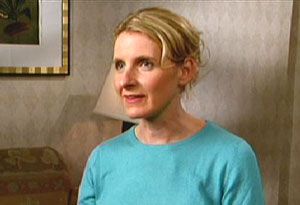
Whether a couple has been legally wed for five months or 50 years, there's one thing they can all agree on—every marriage is unique. Marriage itself is an ever-changing, evolving institution that differs wildly from home to home, country to country.
"It's really fascinating how we're all alike and how we're also very different, what works and what doesn't," Oprah says.
Author Elizabeth Gilbert opened up about her first, failed attempt at marriage in her best-selling memoir Eat, Pray, Love. Now, she explores the history of the institution and reveals why she decided to marry again in her latest book, Committed .
Read the first chapter of Committed .
"We have this line that we repeat in this country that the history of marriage is this sacred, ancient, inevitable union between one man and one woman, which is very sweet and it's very lovely," she says. "It just doesn't happen to be true."
Elizabeth says that for centuries marriage was often the union between one man and several women. "In the ancient world, it was a way of gathering kinship and expanding your circle of family. In the medieval world, it was an economic bond," she says. "The only thing that's consistent about the history of marriage is change."
"It's really fascinating how we're all alike and how we're also very different, what works and what doesn't," Oprah says.
Author Elizabeth Gilbert opened up about her first, failed attempt at marriage in her best-selling memoir Eat, Pray, Love. Now, she explores the history of the institution and reveals why she decided to marry again in her latest book, Committed .
Read the first chapter of Committed .
"We have this line that we repeat in this country that the history of marriage is this sacred, ancient, inevitable union between one man and one woman, which is very sweet and it's very lovely," she says. "It just doesn't happen to be true."
Elizabeth says that for centuries marriage was often the union between one man and several women. "In the ancient world, it was a way of gathering kinship and expanding your circle of family. In the medieval world, it was an economic bond," she says. "The only thing that's consistent about the history of marriage is change."
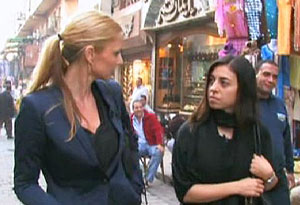
Halfway around the world in Cairo, Egypt, a city teeming with 20 million residents, the traditional idea of marriage is being tested. In Egypt, one in three marriages end in divorce, making it the country with the highest divorce rate in the Arab world.
Nanna Norup, a woman Oprah met while visiting Copenhagen, Denmark , travels to Cairo to speak with Egyptian women about their marital experiences. First, Nanna meets Heba, a 33-year-old interior designer in Cairo who is divorced.
For centuries, only men could initiate a divorce. Then, just 10 years ago, women were given the power to go to court and end their marriages. Men still aren't required to go through official, legal proceedings. They can simply tell their wives they want a divorce, and the marriage is over.
Though divorce is becoming common, Heba says it's not highly regarded. "It's a bit of a stigma for a woman," she says. After a divorce, Heba says many women, like herself, move back into their parents' homes.
In Denmark, people don't always choose to get married to their long-term partners. Nanna says she and her boyfriend have lived together for 14 years but feel no pressure to marry.
In Egypt, however, living together out of wedlock is a major taboo, Heba says. "We can't live with our boyfriends," she says. "It wouldn't be socially accepted."
Nanna Norup, a woman Oprah met while visiting Copenhagen, Denmark , travels to Cairo to speak with Egyptian women about their marital experiences. First, Nanna meets Heba, a 33-year-old interior designer in Cairo who is divorced.
For centuries, only men could initiate a divorce. Then, just 10 years ago, women were given the power to go to court and end their marriages. Men still aren't required to go through official, legal proceedings. They can simply tell their wives they want a divorce, and the marriage is over.
Though divorce is becoming common, Heba says it's not highly regarded. "It's a bit of a stigma for a woman," she says. After a divorce, Heba says many women, like herself, move back into their parents' homes.
In Denmark, people don't always choose to get married to their long-term partners. Nanna says she and her boyfriend have lived together for 14 years but feel no pressure to marry.
In Egypt, however, living together out of wedlock is a major taboo, Heba says. "We can't live with our boyfriends," she says. "It wouldn't be socially accepted."
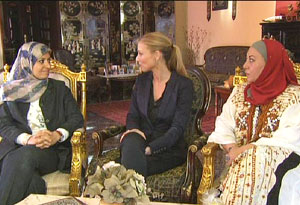
While in Cairo, Nanna also met Injy, a 37-year-old journalist and mother, and Dr. Heba Kotb, a 42-year-old marriage counselor and mother. Both of these women choose to wear the traditional head scarf.
Watch as Nanna tours Dr. Heba Kotb's home.
As a divorced woman, Injy says she's aware of the frustration felt by many unmarried men and women in Egypt.
"There is sexual frustration in Egypt. It's a fact," she says. "Because of religion, you cannot, or you should not, have sex before marriage. And because of the economic situation, many men cannot afford to get married and start a family. Therefore, they don't end up getting the sex that they need up until their mid-30s or even after that."
Despite some misconceptions, Injy says Islam encourages married couples to have a healthy, fulfilling sex life.
"It's the sayings of the prophet. … He tells men that they need to engage in foreplay," Injy says. "It's very much encouraged to give pleasure to the woman, for this to be a very intimate and mutually fulfilling relationship."
Watch as Nanna tours Dr. Heba Kotb's home.
As a divorced woman, Injy says she's aware of the frustration felt by many unmarried men and women in Egypt.
"There is sexual frustration in Egypt. It's a fact," she says. "Because of religion, you cannot, or you should not, have sex before marriage. And because of the economic situation, many men cannot afford to get married and start a family. Therefore, they don't end up getting the sex that they need up until their mid-30s or even after that."
Despite some misconceptions, Injy says Islam encourages married couples to have a healthy, fulfilling sex life.
"It's the sayings of the prophet. … He tells men that they need to engage in foreplay," Injy says. "It's very much encouraged to give pleasure to the woman, for this to be a very intimate and mutually fulfilling relationship."
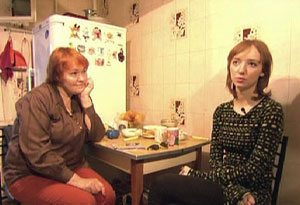
Ukraine, once a part of the former Soviet Union, is a country in Eastern Europe about the size of Texas. The majority of Ukrainians work in low-paying industrial jobs, but the country also has a reputation as the home of many beautiful women. Though men don't feel a pressure to marry at any age, marriage becomes a priority for women around the age of 17. "By the time you are 19, next thing you see is 20 and you're considered an older woman," says Lera, a Ukrainian woman. "By the time you're 25, some doctors will tell you you shouldn't be having a child."
Watch women debate Ukrainian stereotypes and the significance of the Muslim head scarf after the show.
Lera grew up in a two-bedroom home with her brother and mother in Ukraine. Though her mother is a cardiologist, Lera says she only makes $100 a month and had to work two other jobs to support the family. "I think in America, people expect more happiness. Here, people settle for a lot less," Lera says. "I think Ukraine may get a little bit more advanced, but it will take decades, and I always felt like I just don't have the time to wait for Ukraine to catch up with me."
At 19, Lera decided to post her profile on a mail-order bride website in order to move to the United States. On these sites, men pay thousands of dollars to bring a wife to their county. "For me, it was an arrangement where someone would help me get a visa and perhaps a green card—and a husband comes with the deal," she says.
Unlike some other women on these sites, Lera says she did her best to show her true self in her profile. "I didn't want my profile to scream, 'Buy me,'" she says. "I know it will sound a little cliché, but I wanted someone to like me for me."
Watch women debate Ukrainian stereotypes and the significance of the Muslim head scarf after the show.
Lera grew up in a two-bedroom home with her brother and mother in Ukraine. Though her mother is a cardiologist, Lera says she only makes $100 a month and had to work two other jobs to support the family. "I think in America, people expect more happiness. Here, people settle for a lot less," Lera says. "I think Ukraine may get a little bit more advanced, but it will take decades, and I always felt like I just don't have the time to wait for Ukraine to catch up with me."
At 19, Lera decided to post her profile on a mail-order bride website in order to move to the United States. On these sites, men pay thousands of dollars to bring a wife to their county. "For me, it was an arrangement where someone would help me get a visa and perhaps a green card—and a husband comes with the deal," she says.
Unlike some other women on these sites, Lera says she did her best to show her true self in her profile. "I didn't want my profile to scream, 'Buy me,'" she says. "I know it will sound a little cliché, but I wanted someone to like me for me."
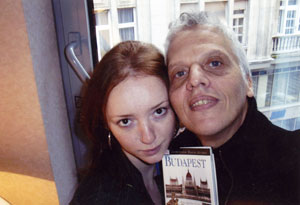
Half a world away, a 50-year-old New Yorker named Steve found himself lonely and looking for someone to talk to after September 11. "Lower Manhattan was just completely traumatized," he says. "I think people had a different take on life and relationships because of how tenuous they saw life was."
Steve posted his profile on a mail-order bride site and connected with Lera. They began emailing every day. "I got Lera's email and it rang so genuine. It was so different. The other ones sounded coached and stiff, and Lera sounded like it could be somebody down the block or across the hall."
After three months, Steve visited Lera in Kiev. "The moment I walked off the plane, it turned into something more," he says. "I was already in love with her. I didn't know her, but I felt like I knew her all my life."
A courtship began. "Unlike other mail-order bride stories, Steve legitimately dated me for many, many months," Lera says. "He came to see me in Kiev. We traveled together."
In 2004, Steve and Lera married just two days after she arrived in the United States. Though they don't consider their union traditional, they say they are in love and happily married. "Suddenly I had this man in my life. Not like a boy," she says. "It was something I really wanted, and suddenly it magically appeared in front of me."
Steve posted his profile on a mail-order bride site and connected with Lera. They began emailing every day. "I got Lera's email and it rang so genuine. It was so different. The other ones sounded coached and stiff, and Lera sounded like it could be somebody down the block or across the hall."
After three months, Steve visited Lera in Kiev. "The moment I walked off the plane, it turned into something more," he says. "I was already in love with her. I didn't know her, but I felt like I knew her all my life."
A courtship began. "Unlike other mail-order bride stories, Steve legitimately dated me for many, many months," Lera says. "He came to see me in Kiev. We traveled together."
In 2004, Steve and Lera married just two days after she arrived in the United States. Though they don't consider their union traditional, they say they are in love and happily married. "Suddenly I had this man in my life. Not like a boy," she says. "It was something I really wanted, and suddenly it magically appeared in front of me."
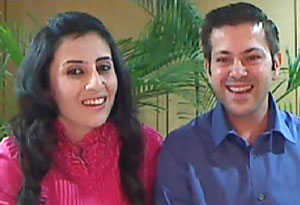
As the world's second most populated country, India has one of the fastest-growing global economies. Still, 95 percent of Indian couples have arranged marriages, which is what happened for 31-year-old Shalin and his 27-year-old wife, Sneha. "We met over dinner, and it was her parents and my parents. We were all there for a family dinner, basically," Shalin says. "It was very awkward. You've got your parents and you're sitting there. And you can't be looking at the girl and saying: 'You know what? The two of us should just walk out.'"
A week after that dinner, Shalin spent a Sunday with Sneha. "At that time, I was certain in my mind that this is a spark," he says. "So I asked her, 'Can I proceed ahead and ask my parents to speak to your parents?''"
Sneha said yes. "I felt quite excited after it, but I was still very nervous," she says.
After two dates, Shalin and Sneha were engaged. Their wedding was a three-day affair.
A week after that dinner, Shalin spent a Sunday with Sneha. "At that time, I was certain in my mind that this is a spark," he says. "So I asked her, 'Can I proceed ahead and ask my parents to speak to your parents?''"
Sneha said yes. "I felt quite excited after it, but I was still very nervous," she says.
After two dates, Shalin and Sneha were engaged. Their wedding was a three-day affair.
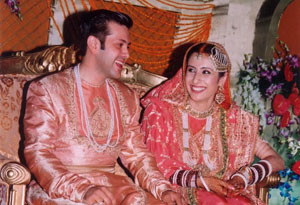
Once married, Shalin and Sneha still had much to learn about one another, which made the first 24 hours of their marriage an eye-opening experience. "I like one side of the bed," Shalin says. "Suddenly in the first night she was sleeping on that side of the bed, and I'm like: 'That's not my favorite side. How do I tell her?'"
Sneha says she made an even bigger discovery. "The most surprising thing was that I didn't know that he smokes," she says. "I wasn't negative. I wasn't hurt. I was just shocked because it's a big part of your life if someone smokes, and I didn't know about it."
Though arranged marriages are an old tradition, Shalin says compatibility—and eventually love—are always taken into consideration. "The arrangement part of it is when your family comes in and tries to help you find someone who is more compatible within your circle, within your knowledge, within their knowledge," he says. "As we stay together, we begin to understand each other. There's compatibility, and love grows over time. I think it's very difficult for someone to say you love someone within a few moments. It takes time, and you need to have that much tolerance, patience and fun to ensure that you love the person."
When she married, Sneha says she hoped to fall in love with Shalin. Five and a half years later, that dream has come true. "We love each other," she says.
Sneha says she made an even bigger discovery. "The most surprising thing was that I didn't know that he smokes," she says. "I wasn't negative. I wasn't hurt. I was just shocked because it's a big part of your life if someone smokes, and I didn't know about it."
Though arranged marriages are an old tradition, Shalin says compatibility—and eventually love—are always taken into consideration. "The arrangement part of it is when your family comes in and tries to help you find someone who is more compatible within your circle, within your knowledge, within their knowledge," he says. "As we stay together, we begin to understand each other. There's compatibility, and love grows over time. I think it's very difficult for someone to say you love someone within a few moments. It takes time, and you need to have that much tolerance, patience and fun to ensure that you love the person."
When she married, Sneha says she hoped to fall in love with Shalin. Five and a half years later, that dream has come true. "We love each other," she says.



